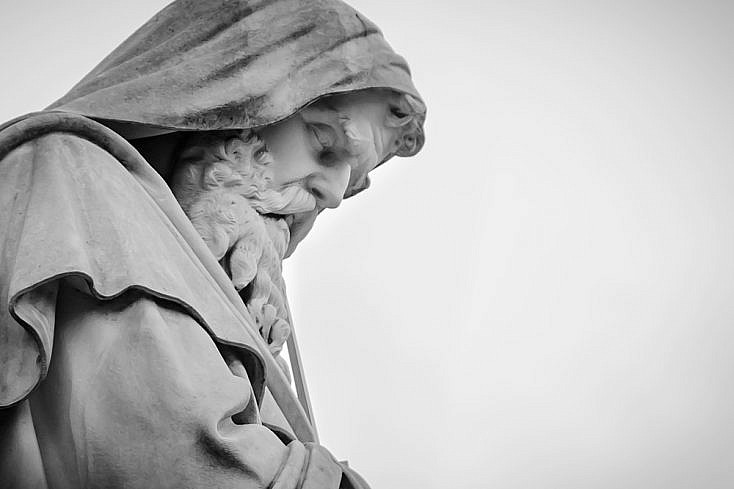
Pharisee, son of Pharisees, but also a Roman citizen born in Tarsus. That is Saul or PaulJudaism and Hellenism are the traits that mark a man who holds the citizenship of the empire. In the last two centuries, especially in the lands of the Germansome even attributed to him the category of inventor of Christianity and even advocated a return to the real Jesus who, like Socrates, had written nothing.
But questioning Paul implies blurring the ChristThe Bible, however, is very clear in stating, after the Resurrection, the words of Jesus: "Jesus said to the disciple of Paul: 'I am not a man of the resurrection, but a man of the Resurrection. However, the evangelist Luke, a disciple of Paul, is very clear in stating, after the Resurrection, the words of Jesus: "...".Thus it is written: the Messiah will suffer, he will rise from the dead on the third day, and in his name conversion for the forgiveness of sins will be proclaimed to all peoples, beginning from Jerusalem." (Lk 24:46-47).
In fact, Paul began in Jerusalem, traveled through the Hellenistic world and ended his journey in the Rome imperial. Thanks to Paul, Christianity profoundly transformed the nature of these cities and cultures.
Capital of the Jewish religion and nation, it is the expression of a millenary cult that has led to a religion of precepts in which man seems obliged to reach salvation by his own effort. The result is a law without love, and explains the reproach of the prophet Isaiah to a people who honor God with their lips, although their heart is far from Him (Is 29:13).
Routine has invaded the Judaic religion and has muted the exhortations to the repentance and penance, transmitted by the prophets. The Sadducees have accommodated themselves to the Roman occupation and question all transcendence, and the Pharisees believe they have achieved religious purity with strict observance.
It is not strange that the young Saul pursues the disciples of Jesus with blood and fire, considering that the future of religion is at stake. Only after his conversion will he understand that Christ is the fulfillment of the promises of Jesus. GodHe will not come to abolish the law and the prophets, but to give them fullness. He does not succeed in convincing many Jews of this and will end up addressing the Gentiles, while stressing that God has not rejected his people, for the gifts and the call of God are irrevocable (Rom 11:1, 29).
Paul proclaims the Gospel in Asia Minor and would have remained in that region had he not had a stranger dreamThe first was that of a Macedonian who begged him to come and help them (Acts 16:9).
The apostle goes on to Greece and evangelizes in Philippi, Thessalonica and Corinth, and also in Athens, where he delivers his speech in the Areopagus on the basis of the existence of an inscription dedicated to the unknown God. He manifests this God with the quotation of "God of the Unknown God".we are your offspring", attributed to the poet Aratus of Cilicia, but meets with the rejection of the Epicureans, similar to that of the Sadducees, when he announces a man risen from the dead.
It would seem that in Athens a choice had to be made between the Stoics and the Epicureans, between the resignation and pleasure to escape from the anxieties of the life. The Hellenic world had renounced the yearning for salvation present in other times. It did not listen to an inner voice, like Socrates, nor did it subscribe to Antigone's assertion that she was not meant to share in the hate but love. Paul, on the other hand, proclaims to them a universal message, in which there is neither Jew nor Greek [...] for they are all one in Christ Jesus (Gal 3:28).
Paul arrives at Rome in the spring of 61 and comes laden with chains, but they are the chains of a Roman citizen who freely appealed to Caesar's court to escape the machinations of the Jewish rulers, and is proud of his citizenship.
The Roman Empire then appears to be an example of administrative organization, and the law, which marks the difference with the arbitrariness of the Eastern empires, is intended to govern an imposing building, and whose greatness is also testified by the public works, which rise throughout the dominated lands.
However, in the first century the legacy of republican institutions and traditional Roman virtues faded away. The cult of the emperors has been transforming the government of Rome in the most similar to an oriental tyranny, which debases the village with panem et circenses. But the Stoic philosophy, represented by Seneca or Marcus Aurelius, will not save the Rome because it is a minority creed.
A Rome The universal citizenship proclaimed by Paul and the fact that it will be saved, on the other hand, by the fact that Pedro establish there the Church. The Christ of the apostles became Roman by anointing Rome with his seal and purchasing it with his blood.
Antonio R. Rubio Plo
Degree in History and Law
International writer and analyst
@blogculturayfe / @arubioplo
Published in "Alfa y Omega",